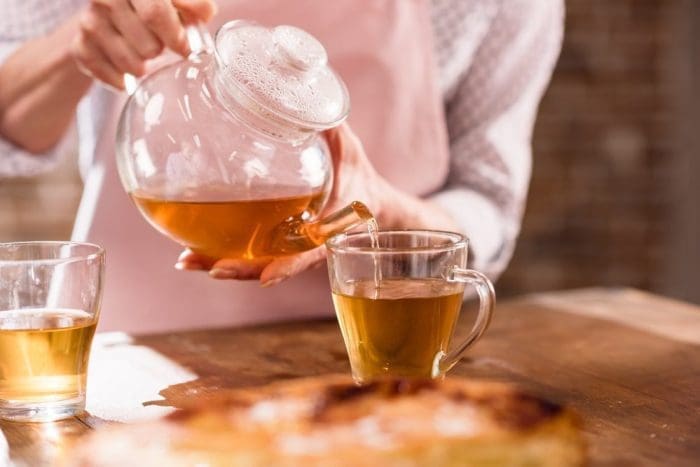Tea time just got a whole lot more mindful. Today, we’re spilling the tea on a little well-known secret: tea meditation.
With tea meditation, you can turn your ordinary cup of tea into a powerful tool for practising mindfulness in the chaos of everyday life.
Here at Lotus Scoop, we’ll show you how to find your zen in a cup of tea with 7 simple steps.
The Art of Tea Meditation
Did you know the connection between tea and meditation runs deep? Centuries ago, tea culture spread across the Far East; Buddhist monks in Tibet and Zen monks in Japan turned to tea to aid in their meditation practices.
You don’t have to be a Buddhist or Zen monk to practise tea meditation – it’s something anyone can do, no matter your background or level of experience.
Tea meditation is more than just brewing a cup of tea and zoning out. It’s about approaching the entire process of making tea with mindfulness.
1. Choose a Tea
The first step in tea meditation is just like the entire meditation itself: simple. Select a brew that you’ll enjoy, whether loose-leaf or tea bags. After all, the best tea for meditation is any tea. But there are a few kinds worth considering.
With their high antioxidant and amino acid content, green teas offer alertness and mental clarity with a subtle caffeine boost.
Herbal teas are like nature’s hug in a cup: caffeine-free and bursting with a variety of flavours and perks. When it comes to unwinding and melting away stress, nothing beats the soothing powers of chamomile, lavender, and lemon balm teas.
Peppermint and ginger teas can enliven the senses and aid digestion, while hibiscus and rosehip teas offer fruity notes and antioxidant properties.
2. Find a Cosy Nook
Next, find a cosy nook where you can conduct your tea meditation. It doesn’t need to be extravagant; what matters is its intention. It could be anywhere, as long as you designate a spot that enhances your experience.
In Japan, small tea huts were created specifically for tea enjoyment, further emphasising the importance of a dedicated space.
So, whether it’s a small coast corner of your home or a serene outdoor spot, make it your sanctuary for your tea meditation.
3. Prepare the Tea (and Your Time)
Clear your mind before even picking up your tea or boiling the kettle. This way, nothing else bothers you when you’re sipping your tea. Remember, it’s your time, just you and the tea, and that’s all that matters.
Carve out a specific time (daily) for your tea meditation. It could be in the morning for a gentle start, during mid-day for a recharge, or in the evening for self-care and relaxation.
Ultimately, it’s about clearing your mind of any worries or distractions.
4. Observe the Pour
Embrace stillness as the kettle boils. Listen to its gentle hum, observing the steam rising. While waiting, take deep breaths, immersing yourself in the present moment.
As the water begins to boil, observe the pace quickening and the steam escaping the kettle. Embrace the slowness of this process, letting go of any nagging thoughts.
Once the water is ready, pour it over your teabag or tea leaves and watch as the colour deepens. If you enjoy your tea with milk, cream, sugar, or honey, add them with intention. Consider why you want each addition and how much you truly need, savouring the mindful act of preparation.
5. Engage Your Senses
This step is about acknowledging the tea (and yourself, technically). Take a moment to acknowledge the journey the tea has taken to reach you, from growth to processing. Give thanks for this moment.
Listen as the tea pours into the cup.
Inhale, exhale.
Notice the aroma, the warmth of the cup in your hands. Sip the tea slowly, feeling it on your tongue and down your throat. Pay attention to the sensations and how your body responds.
Focus all your attention on staying in the present moment. Let your senses guide you as you immerse yourself in the simple pleasure of tea – one sip at a time.
6. Sip and Savour
As you sip your tea, practice mindfulness by saying, “Simply this.” Pause and fully experience the moment. Feel the warmth of the cup in your hands and notice its solid construction and shape.
Take in the aroma of the tea – does it smell light and floral, fruity, or earthy and robust? When you sip, let the tea linger in your mouth, savouring the flavour as it spreads across your tongue.
As you do this, you become fully present with the tea, using it as an anchor to bring you back to the present moment whenever your mind wanders.
7. Continue to Sip While Practising Mindfulness
As you continue to sip your tea, pay attention to how you’re feeling inside – notice any thoughts or emotions that might pop up, and just let them be.
After you finish your tea, put the cup down and close your eyes for a moment. Check-in with yourself and see if anything has changed. You may feel more relaxed or energised, or your mind may feel calmer.
Think about your tea meditation and write down your thoughts and feelings about it. This helps you understand what makes this tea special to you. If you feel peaceful, keep that feeling as you go about your day.
Final Thoughts
That’s all there is to practising tea meditation! All you need is your favourite tea, a cup, a quiet spot, and your breath.
Although it’s simple, it offers significant benefits, such as reduced stress, improved focus, and a greater feeling of inner peace.



